A Glimpse of the New Progress Conference of Emergency Medicine Branch of Chinese Geriatric Society in 2024
I. Workshop training module in the afternoon of August 30
The operation training module in the afternoon of August 30 (Friday) is aimed at improving emergency practice diagnosis and treatment technology and serving elderly patients. It covered a number of important sessions such as the tracheoscopy Workshop, the non-invasive respiratory Support Workshop, the Appropriate Traditional Chinese Medicine Technology Workshop for critically ill patients, and the Group Standard Project Seminar on nutrition treatment for Chinese emergency patients, which injected new vitality into the improvement and development of the technical practice of emergency medicine.
1. Tracheoscopy Workshop was held in Hall A of Smoke LAN: Professor Guo Wei from Beijing Hospital of Traditional Chinese Medicine, Capital Medical University, first delivered a speech and explained the Expert Consensus on the application of Bronchoscopy in Emergency Department. Then, Professor Li Jianguo from Beijing Tiantan Hospital, Capital Medical University, laid the theoretical foundation for the subsequent practical operation through a vivid diagram of the lung trachea and bronchus. In the Workshop training session, Professor Xu Bin, Professor Sun Caihui and Professor Wang Xusheng led the students to operate hand by hand. The atmosphere was warm and the interaction was frequent.
2. The non-invasive Breathing Support Workshop is held simultaneously in Hall B: Professor Sun Feng from the First Affiliated Hospital of Nanjing Medical University first introduced the application of non-invasive ventilation in the emergency department, and then Dr. Chen Tengfei from Beijing Hospital of Traditional Chinese Medicine Affiliated to Capital Medical University and Mr. Li Feng from Wei Shengkang Medical Technology (Jiangsu) Co., Ltd. respectively gave an in-depth analysis on the application of high-flow oxygen therapy and the principle of non-invasive ventilation. In the practice session, Liu Jianguo, teacher of Beijing Hospital of Traditional Chinese Medicine, shared the nursing of non-invasive respiratory support (NIV&HFNC), and the participants experienced the operation of non-invasive ventilator and high-flow oxygen therapy equipment, and gained a lot.
3. The TCM Technology Workshop for critically Ill Patients was held in Hall A of Daguan. Dr. Chen Tengfei from Beijing Hospital of Traditional Chinese Medicine Affiliated to Capital Medical University was the academic host. Li Shen, Li Qianqian and other experts respectively explained in detail the application of TCM suitable technology in acute critically ill patients, and the TCM characteristic diagnosis and treatment technology of acute cerebrovascular disease, and demonstrated the operation of some TCM suitable technology. The subsequent group operation practice session allowed the participants to personally experience the charm of TCM technology.
4. The Chinese Emergency patient nutrition Treatment group Standard Project seminar was warmly held in Hall B of Daguan. The meeting was co-chaired by Prof. Deng Ying from the Second Affiliated Hospital of Harbin Medical University and Prof. Du Junkai from the First Affiliated Hospital of Xi 'an Jiaotong University. After Professor Guo Wei delivered the opening speech, experts from a number of well-known hospitals across the country conducted in-depth discussions on intestinal protective feeding strategies and group standard projects for nutritional treatment of emergency patients, providing strong support for the standardization and standardization of nutritional treatment of emergency patients.
?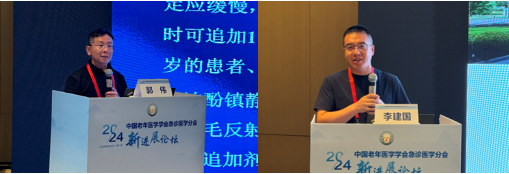
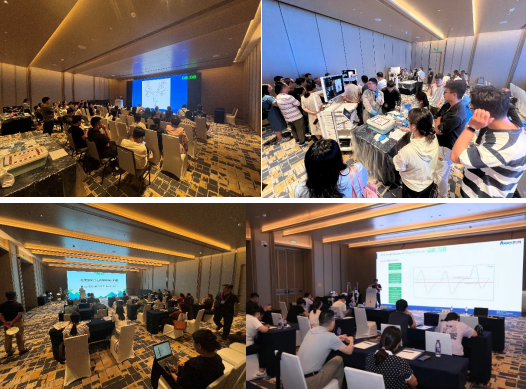

2. Committee meeting of the Emergency Medicine Branch of the Chinese Geriatric Society
The committee meeting of the Emergency Medicine Branch of the Chinese Geriatric Society was presided over by Professor Liu Zhi from Xuanwu Hospital of Capital Medical University. Xu Xiaodong, Vice President and Secretary General of the Chinese Geriatric Society, and Guo Wei, President, delivered speeches respectively. Guo Wei, President of the Emergency Medicine Branch, 6 Vice presidents of the branch (Yin Ming, Jian Xiangdong, Su Enben, Yan Xianliang, Ma Yuefeng, Tang Youqing professors), General Director Professor Xu Bin, and 3 deputy directors General (Cao Zhanyu, Chen Li, Zhao Yue) were present. 51 Standing committee members attended, 34; A total of 270 members signed in 143 people (more than half arrived at the scene). At the meeting, Professor Xu Bin made a comprehensive report on the work of the Emergency Medicine Branch in 2024, and had a warm discussion on the location of the annual meeting in 2025, and Professor Tang Youqing actively promoted the holding of the branch in Guangzhou in 2025. The whole audience applauded, this is really to promote the development of the emergency department, care about the emergency of the plenary meeting.
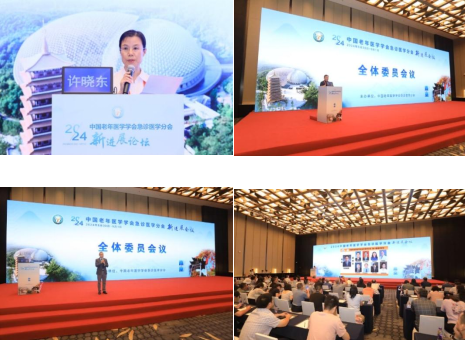
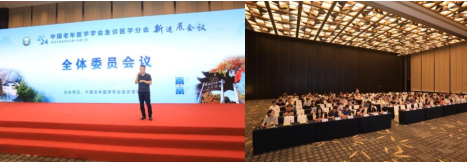
On August 31, the opening ceremony and offline meeting of the New Progress Conference of the Emergency Medicine Branch of the Chinese Geriatric Society
1. On the morning of August 31, the main venue & Opening ceremony of the New Progress Conference of the Emergency Medicine Branch of the Chinese Geriatric Society:
The New Progress Conference of the Emergency Medicine Branch of the Chinese Geriatrics Society 2024 invited emergency medicine experts, scholars and medical personnel from all over the country to gather together to discuss the latest progress and future trends in the field of emergency medicine.
The guests attending this conference are: Professor Fan Li, President of the Chinese Geriatric Society; Xu Xiaodong, Vice President and Secretary-General of the Chinese Geriatric Society; Professor Guo Wei, President of the Emergency Medicine Branch of the Chinese Geriatric Society; Vice President of the Branch: Six professors, Yin Ming, Jian Xiangdong, Su Enben, Yan Xianliang, Ma Yuefeng, Tang Youqing, as well as dozens of well-known experts and professors in the industry, as well as more than 300 fellow scholars in the emergency department, attended the conference.
At 8 o 'clock in the morning, the meeting kicked off with a rousing opening by Sun Caihui (Nanjing First Hospital) and Liang Yuanyuan (Zhongda Hospital Affiliated to Southeast University). First of all, President Guo Wei delivered the opening speech, he stressed the importance of geriatric emergency medicine, and expressed warm congratulations and high expectations for the convening of this meeting. Subsequently, the president of the Chinese Geriatric Society Fan Li delivered a speech, she reviewed the achievements of the society in promoting the development of geriatric medicine in recent years, and sent a message to the participants to work together to contribute to the cause of geriatric emergency medicine. A number of important launch ceremonies were also held at the opening ceremony. Including the release of "China Elderly Cardiopulmonary resuscitation expert Consensus"; The launch of "Expert consensus on coagulation function examination of the whole process of pulmonary thromboembolism"; "China elderly cardiopulmonary resuscitation group standard development" and "China ischemic stroke emergency first aid group standard development" started; In addition, the compilation of "Diagnosis and Treatment of Common Acute Viral Infectious Diseases" has also been officially launched. The release of a consensus and the launch of four consensus, group bid and book writing carried the hope of experts for the advancement of the elderly emergency cause, and promoted our elderly emergency cause to flourish and move forward vigorously!
Next is the conference paper display session, the paper contest lasted more than three months, a total of more than 40 excellent papers submitted, the outstanding representatives on the rostrum to show:
Professor Liu Zhi and wonderful team representatives - Li Ne (Xi 'an International Medical Center Hospital), Si Feng (Beijing Chaoyang Emergency Rescue Hospital of Integrated Chinese and Western Medicine), Xu Jianlu (Liaocheng Hospital of Traditional Chinese Medicine), Yu Sheng (Changshu Second People's Hospital);
Professor Jian Xiangdong and outstanding team representatives -- Zhang Zhijian (Banan Hospital Affiliated to Chongqing Medical University), Zhang Xueyang (Beijing Luhe Hospital Affiliated to Capital Medical University), Quan Yu (Xuzhou Hospital of Traditional Chinese Medicine);
Professor Xu Tie and distinguished team representatives - Su Chenglei (Xuzhou Medical University Affiliated Hospital), Xu Chunyang (Changshu Hospital Affiliated to Soochow University), Wang Jing (Beijing Tiantan Hospital affiliated to Capital Medical University);
Professor Guo Wei and outstanding team representative -- Shi Mengdi (Shandong University Qilu Hospital).
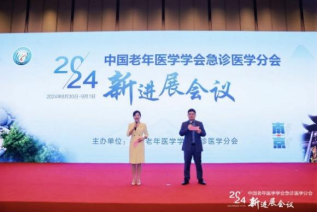

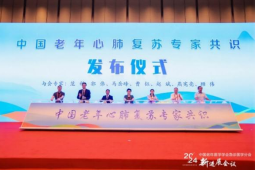
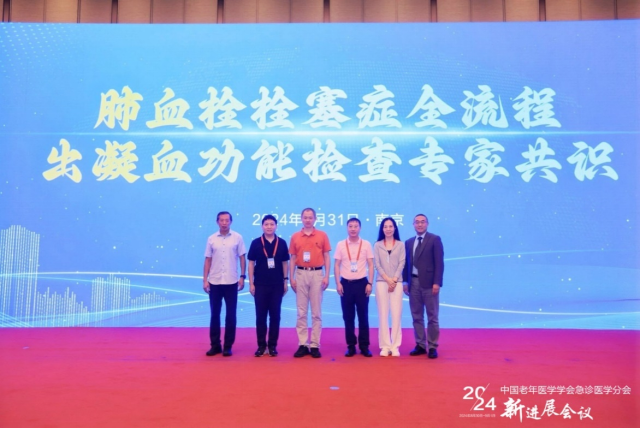
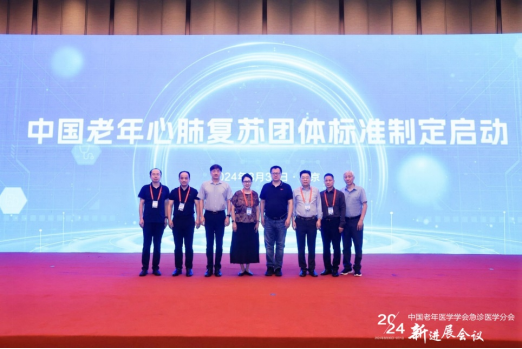
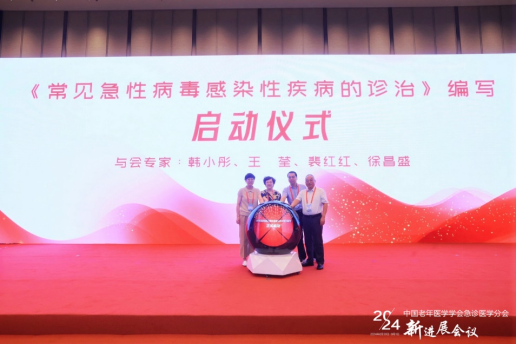
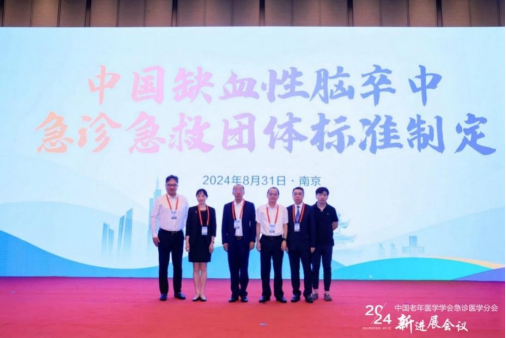
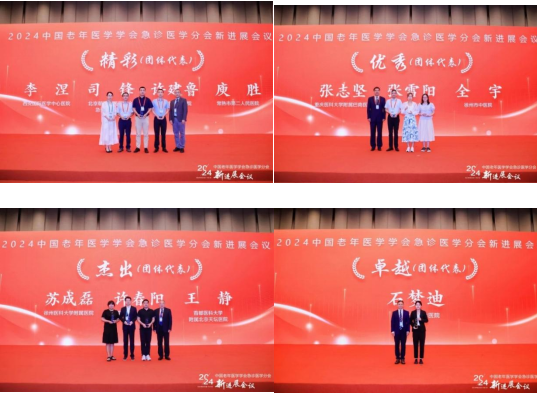
2. Academic feast in the main venue
After the opening ceremony, the main venue immediately entered the intense academic exchange session. First of all, with the topic of "General Medicine and Geriatric comorbidity Management", President Fan Li in-depth analyzed the challenges and strategies of geriatric comorbidity management, providing valuable clinical guidance for participants. Subsequently, President Guo Wei explained in detail the "Consensus of emergency experts in elderly cardiopulmonary resuscitation in China" and shared the latest research results and clinical practice experience. Professor Cao Yu from West China Hospital of Sichuan University, Professor Yan Xianliang from Affiliated Hospital of Xuzhou Medical University and other well-known experts made wonderful speeches on hot topics such as "fluid resuscitation of septic shock" and "Innovative development of emergency quality control". In addition, Mr. Li Peng of Basic Egg Biotechnology Co., Ltd. also introduced the innovative application of basic egg biology in the high-quality development of emergency medicine, bringing cutting-edge scientific and technological perspectives to the participants.

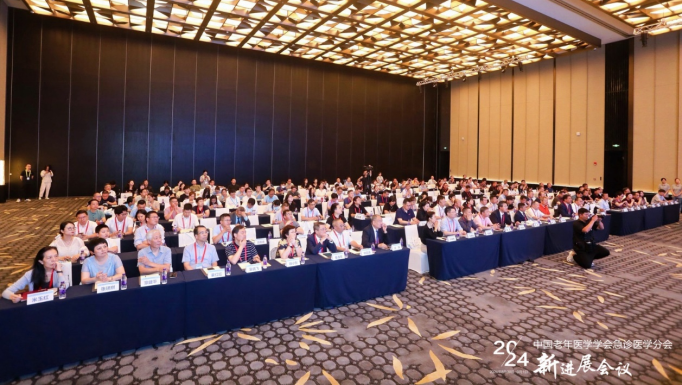
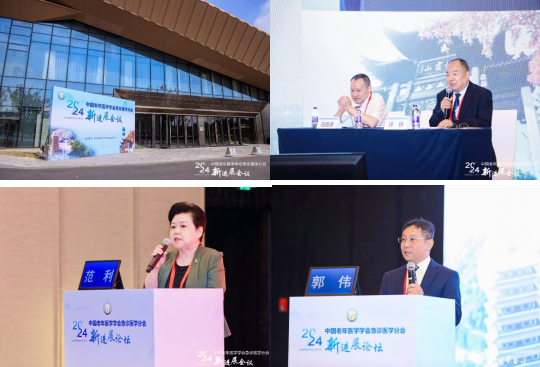
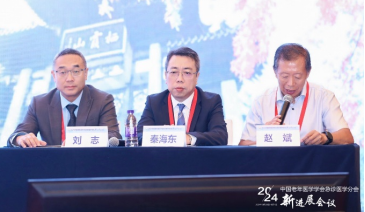
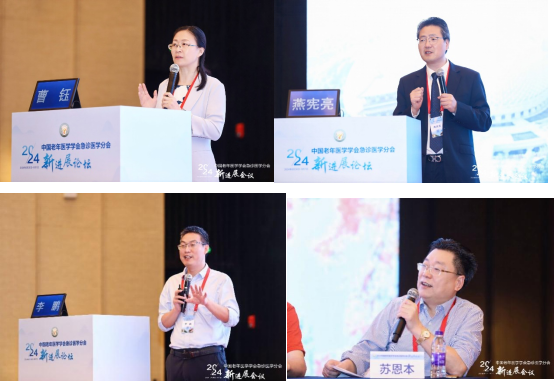


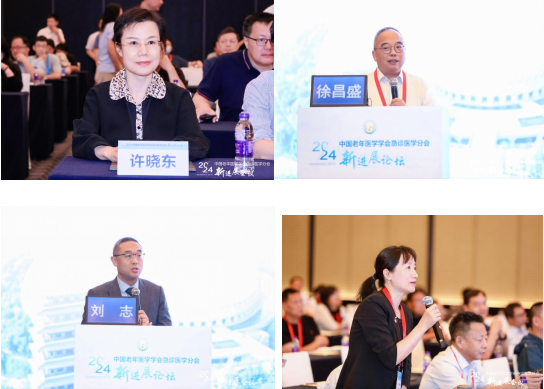
3. The sub-venue is full of highlights
After the academic conference in the main venue in the morning, five sub-conferences were set up in the afternoon, including trauma and infection, severe illness and nutrition, emergency stroke, emergency cardiopulmonary resuscitation and emergency Chinese medicine, covering many important fields of emergency medicine.
(1) Trauma and Infection session: The session leaders were Prof. Shan Zhigang, Prof. Tang Yuqing and Prof. Li Fengjie; The first session of the academic chair Pei Qiao, Su Chunhua, Teng Yue professors; Professor Tang Yuqing shared the characteristics and prevention strategies of post-traumatic infection, and Professor Chen Li discussed the content of traumatic body temperature management. Under the academic chairmanship of Professor Yan Xianliang, Professor Tu Su discussed the topic on the application of fluoroquinolone-free in post-epidemic respiratory tract infection, and the guests Xu Bin, Wang Jun, Wang Jian and other professors had a full and in-depth discussion; Professor Qin Haidong brought the content of "Emergency experts Consensus on adult influenza diagnosis and treatment norms", which benefited the participating experts and channels. The second session was hosted by Professor Cao Zhanyu and Professor Yu Tao. Professor Li Fengjie shared the contents of the treatment of cardiac trauma, and Professor Wang Quan discussed the characteristics of the treatment of pediatric trauma. The experts conducted in-depth discussions on the characteristics and prevention strategies of post-traumatic infection, traumatic temperature management, and principles of emergency treatment for multiple injuries.
(2) Severe Diseases and Nutrition Session: Session leaders Kang Jian, Gu Wei, Professor Li Xiaojing; Prof. Jining Liu, Prof. Weihai Yao, Prof. Yan Chen); Professor Pei Honghong talked about the nutritional support treatment strategy of sepsis /ARDS, and Professor Du Junkai discussed whether early enteral nutrition support is a contraindication of septic shock. Professor Han Xiaotong shared the topic When poisoning meets ECMO, and Professor Zhu Lungang shared the content of enteral nutrition complications and management of severe patients. The second session was presided over by Prof. Li Xuebin, Prof. Wang Yong and Prof. Huang Man. Professor Mi Yuhong discussed the impact of intestinal microecological imbalance on severe patients, the topic of "Precise positioning, scientific treatment - focusing on the selection of antibiotics for CRO infection" brought by Professor Mei Xue, Professor Wang Cong discussed the problem of the timing of enteral nutrition in acute severe pancreatitis, and Professor Zhang Yingqi shared hot topics such as enteral nutrition support treatment with mechanical ventilation in the stomach.
(3) Emergency Stroke session: Session leaders: Professor Ma Yuefeng, Professor Xu Bin, Professor Zhou Heng, Professor Hu Bei; In the first session, Prof. Xing Jihong, 马剡芳; The first is Professor Zhou Heng's topic - infection-related ischemic stroke, followed by Professor Gu Wei's interpretation of the diagnosis and treatment strategy of post-awakening stroke, and Professor Xu Bin's case sharing of acute ischemic stroke with aortic syndrome. Academic hosts of the symposium: Professor Guo Wei, Professor Hong Yucai; Professor Sun Hao discusses the key points of standardized treatment for patients with acute hypertension. The second session was chaired by professors Gao Hengbo and Chang Yufei. Professor Hu Bei proposed a solution to reduce intracranial pressure for stroke patients, Professor Wu Xi shared the clinical application practice of mobile stroke unit, and Professor Yang Jianzhong shared the content of airway management for acute stroke patients.
(4) Emergency cardiopulmonary resuscitation session: Session leaders Yan Xianliang, Liu Zhi, Du Xianjin professors; The first session was chaired by Prof. Liu Xiangqun and Prof. Zhao Bin. The topic of Professor Li Xiangmin is the factors affecting the prognosis of cardiopulmonary resuscitation ROSC, and Professor Deng Ying is the topic of the construction and management of resuscitation center. Professor Qin Haidong, academic host of Qilu Symposium, first Professor Chen Xufeng shared the treatment progress of acute heart failure, Professor Ma Qingxiang discussed the treatment progress of cardiogenic shock; Professor Zhao Bin, the academic chair of the Wall Symposium, and Professor Guo Wei shared the interpretation of "Consensus of emergency experts on the application of Bioresistive non-invasive hemodynamic Monitoring in acute and critical care". Prof. Li Junhong, Prof. Zhao Yue, Prof. Liu Shuhua; Professor Xu Jun brought the progress of innovation and transformation of cardiopulmonary resuscitation research, Professor Yang Rongjia proposed the key issues and thoughts of cardiopulmonary resuscitation, and Professor Xu Xiaolong conducted in-depth research on the basic research of acute infection, focusing on the prognostic factors of cardiopulmonary resuscitation, the construction and management of resuscitation centers and other key issues.
(5) Traditional Chinese Medicine Emergency Department: Conference leaders: Professor Wu Caijun, Professor Li Lizhuo, Professor Yan Shouchun; Prof. Li Jie and Prof. Liu Shuhua, academic Chair of the first session; First, Professor Cao Chunshui shared the clinical thinking of emergency diagnosis and treatment of natural epidemic infections. Next, Professor Wu Caijun discussed the diagnosis and treatment strategy of traditional Chinese and Western medicine for non-fermentative bacterial infections. The second session of academic chair Wang Jun, Professor Si Feng; Professor Li Lizhuo shared the treatment technology of bone injury emergency: Modern and traditional themes, and Professor He Xiaojun shared the hot topics and directions of acute and critical care medicine research in 2024. The third session was presided over by Wu Caijun and Zhang Shu; Professor Wang Gang shared the content of sepsis "promoting blood circulation and removing blood stasis" and anticoagulation, and Professor Yan Shouchun brought who said the slow doctor of traditional Chinese medicine? - Talking about the clinical application of TCM first aid technology, Professor Liu Yuchao introduced the application of TCM appropriate technology in elderly patients, and finally Professor Liu Yi shared the diagnosis and treatment of sepsis under the strategy of integrated Chinese and Western medicine. The special advantages and clinical application results of traditional Chinese medicine in emergency treatment were displayed, which provided new ideas for the emergency treatment mode of integrated Chinese and Western medicine.
(6) Empirical Anti-infective treatment of CAP in elderly patients in emergency (closed session) : After Professor Guo Wei's speech, Professor Gu Wei analyzed the contents of Expert Consensus on Emergency Diagnosis and Treatment of community-acquired Pneumonia in Elderly People in China from the initial use of empirical anti-infective drugs. Next, Professor Du Junkai started the theme discussion on the new drug research and development of CAP. At the same time, experts and professors Han Xiaotong, Hu Bei, Ma Yuefeng, Tang Wenxi, Wu Caijun, Xi Xiaoyu, Xing Jihong, Xu Bin, Zeng Hongke, Zhang Shu, Zhang Silong participated in the discussion, and Professor Guo Wei made a final summary. The discussion was full and lively, bringing the experts' thinking and collision from different angles, providing multi-dimensional thinking and inspiration for the new drug research and development of CAP.
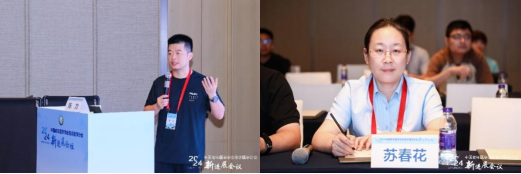
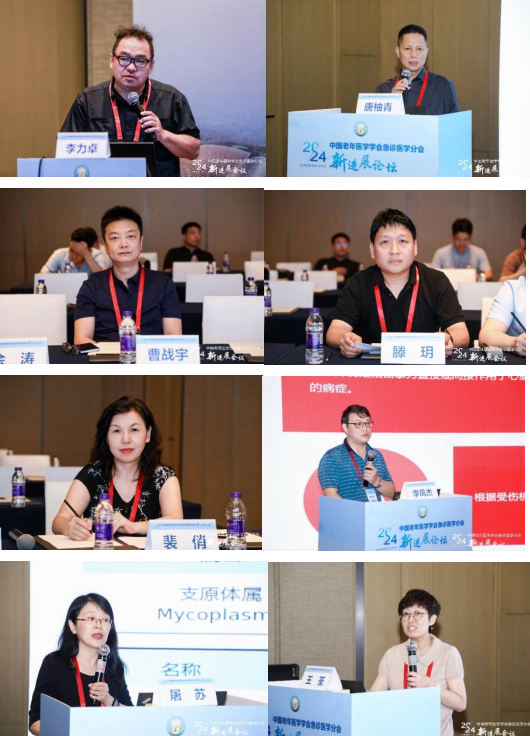
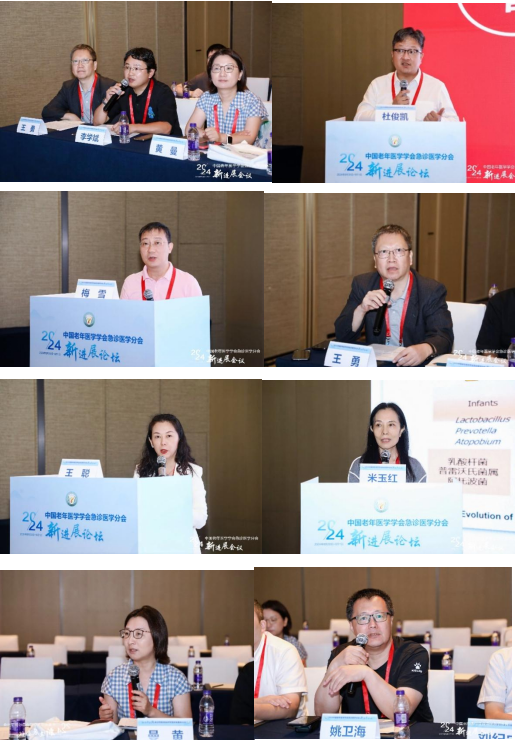
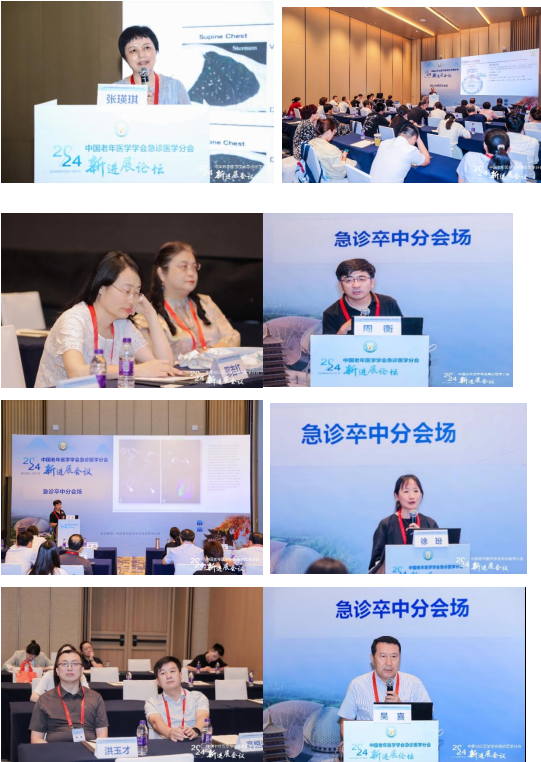
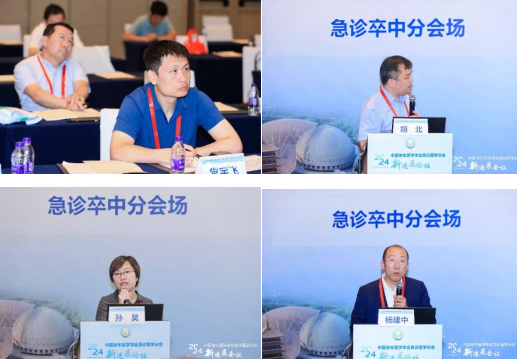
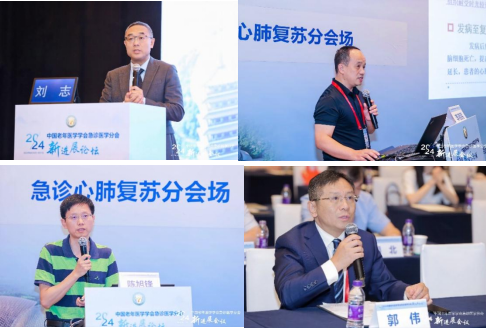
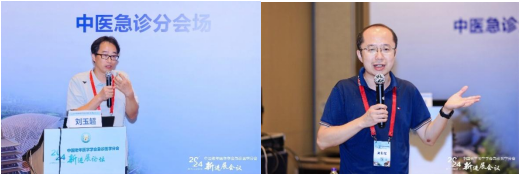
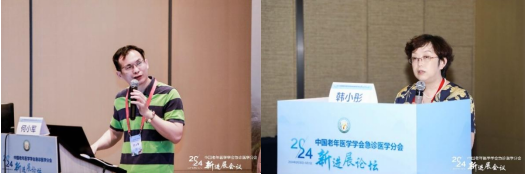
Iv. Online Academic Forum
On the morning of September 1, 2024, the New Progress Conference of the Emergency Medicine Branch of the Chinese Geriatrics Society was broadcast live online through Tencent platform, focusing on the latest progress and frontier exploration in the field of emergency medicine, which attracted the active participation and heated discussions of more than 100,000 medical colleagues.
The conference specially set up a narrative medicine sub-venue, with professors Zhao Bin, Zong Jianping and Yang Rongjia as the venue leaders. In the narrative medicine sub-conference, many experts had in-depth exchanges on topics such as emergency clinical ethics, the integration of humanities and narrative medicine, and the narrative skills of emergency rescue rooms. Professor Zhao Bin shared the practice and thinking of narrative medicine in the emergency clinical ethical dilemma, Professor Zong Jianping discussed the close relationship between the four elements of humanities and narrative medicine, and Dr. Zhang Shikui introduced the narrative skills and practice of emergency rescue room based on actual cases.
In addition, the conference also set up a number of sub-venues, such as poisoning, biomedical engineering innovation, emergency nursing and emergency science popularization, covering a number of important areas of emergency medicine. Poisoning session led by Professor Jian Xiangdong and other experts, in-depth discussion of acute poisoning treatment strategies and quality control indicators; The biomedical Engineering Innovation sub-conference focused on the application of intelligent technology in first aid scenarios, showing the latest achievements of the combination of medical and industrial; The emergency nursing sub-conference and the emergency science popularization sub-conference respectively had extensive exchanges on nurse competency evaluation, patient nursing, emergency science and other contents.
More than 22,500 people visited and listened to the narrative medicine session
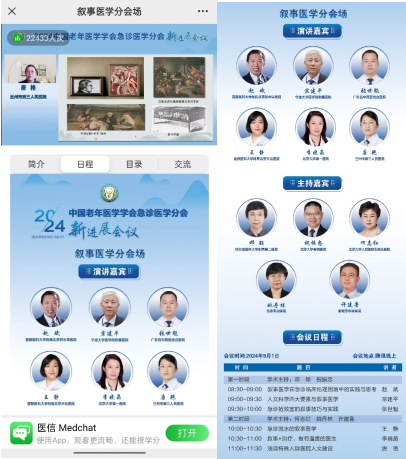
More than 20,000 people browse and listen to the poisoning session
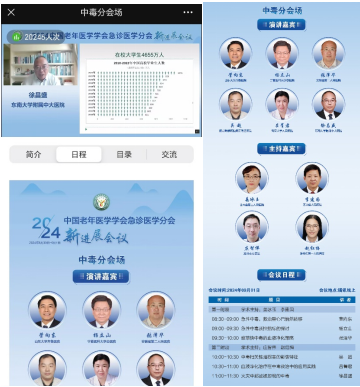
l Biomedical Engineering Innovation branch venue more than 20,000 people browse and listen
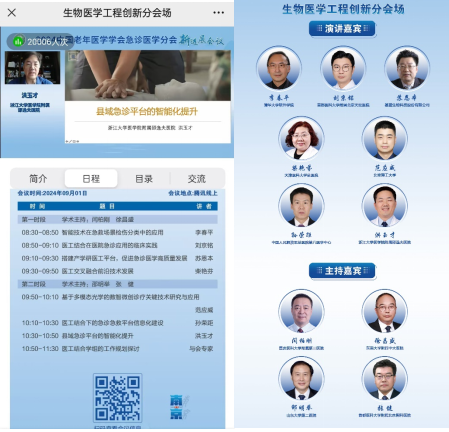
l More than 23,300 people visited and listened to the emergency nursing session
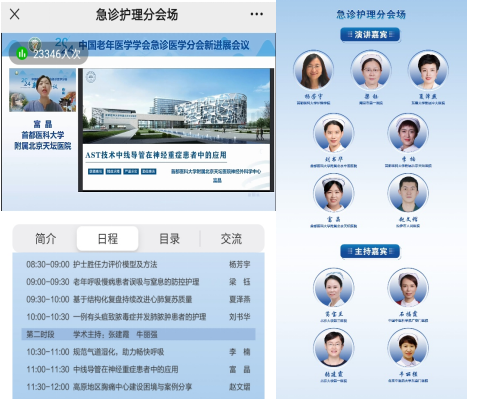
l More than 22,500 people visited and listened to the emergency science popularization branch
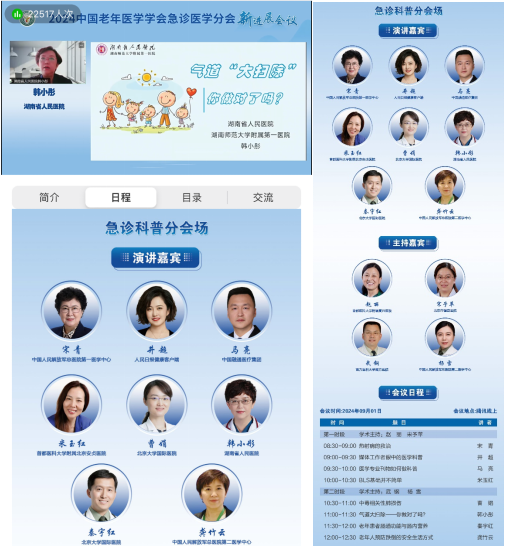
The New Progress Conference of the Emergency Medicine Branch of the Chinese Geriatric Society 2024 not only provides a platform for experts and scholars in the field of emergency medicine to exchange ideas and share experience, but also further promotes the development and innovation of the geriatric emergency medicine discipline. Through the form of online broadcast, the conference broke the geographical restrictions, so that more medical workers can easily participate in this academic feast. In the future, the Emergency Medicine Branch of the Chinese Geriatrics Society will continue to uphold the concept of "innovation, collaboration and sharing" and contribute more to the progress of emergency medicine.

